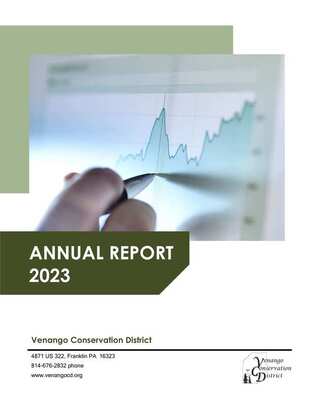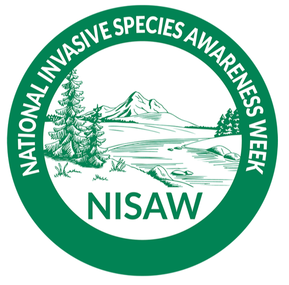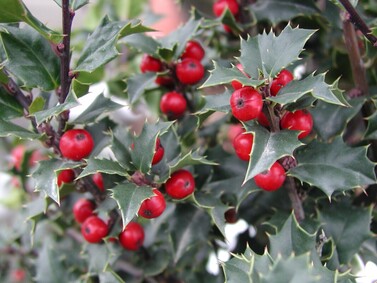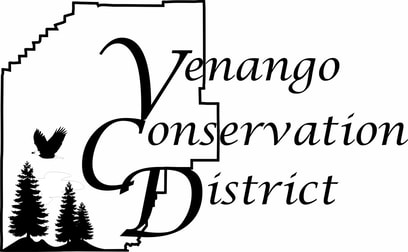 The Venango Conservation District announces funding opportunity for landowners in Venango County to manage invasive species through new pilot program. The Venango Conservation District, in cooperation with local partners, established an invasive species management cost-share program to manage invasive species throughout Venango County. Known as the Venango County Partnerships for Regional Invasive Species Management (PRISM), the grant program seeks to fund projects that manage terrestrial and/or aquatic invasive species in Venango County. Species of plants, animals, insects, and pathogens that do not naturally occur in a defined area and cause harm to the economy, the environment, or human health are considered invasive. Examples include Multiflora Rose, Spotted Lanternfly, and Zebra Mussels. After becoming established in an area, invasive species outcompete native species for food and space and can cause property or agricultural damage. Any landowner including private individuals, municipalities, non-profits, and educational institutions with property located in Venango County are eligible to apply for up to $7,000 per project. A 50:50 match is required (either cash or in-kind). Applications are currently being accepted by the Venango Conservation District until September 30, 2024. The Venango County PRISM program is part of a larger pilot program created by the Pennsylvania Association of Conservation Districts (PACD) and partners from the PA Governor’s Invasive Species Council. After receiving a $210,000 grant from the USDA Forest Service, PACD offered the PRISM pilot program to 13 counties in northwest Pennsylvania. The program will “address the critical need to manage invasive species that threaten Pennsylvania’s economy, environment, and human and animal health by developing strong, diverse stakeholder partnerships,” according to PACD. Interested applicants can find more information including the application form on the Venango Conservation District’s website. For questions or to discuss a potential project, please contact Bailey Kozalla of the Venango Conservation District by calling 814-676-2832 or emailing [email protected]. Financial and other support for the PRISM Pilot Program in NW Pennsylvania is provided by the Pennsylvania Association of Conservation Districts, Inc. through a Landscape Scale Restoration Grant with the Forest Service, U.S. Department of Agriculture (USDA). USDA is an equal opportunity provider, employer, and lender.
0 Comments
The Venango Conservation District, located at 4871 US 322, Franklin, PA 16323, is accepting proposals for a contract to construct approximately 100 feet of stream-bank stabilization and fish habitat in-stream structures in Cherrytree Run located on Sportsman Lane (41.497706, -79.70034) within Cornplanter Township in Venango County, Pennsylvania. The Cherrytree Run Fish Habitat Improvement Project will address an urgent environmental need to stabilize eroding stream banks as well as create standard fish habitat structures. The scope of this project consists of 100’ of stream bank in which 1 modified mudsill structure will consist of four 20 feet long sections. This process is an open call for qualified contractors. The Venango Conservation District is a tax-exempt organization. Proposal prices should be calculated without applicable sales tax. A pre-bid meeting will be held at the project site on Friday, July 12, 2024 beginning at 10:00 a.m. Meeting location will be at 41.497584, -79.700361 on pull off onsite on Sportsman Lane located directly off of Rt. 8. Please contact Bailey Kozalla by calling 814-676-2832 ext. 2 or emailing [email protected] to RSVP for this meeting by 4:00 p.m. on July 11, 2024. Contractor representative attendance at the bid meeting is required for the submission of a successful bid for the project. All construction activities for this project will be subject to the Pennsylvania Prevailing Wage Act of 1961. Prevailing wage rates determinations from the Pennsylvania Department of Labor and Industry for this project are attached. Sealed proposals must be received by the Venango Conservation District by 3:00 pm on July 26, 2024. Proposals may be sent via email in pdf format to Bailey Kozalla: Bailey Kozalla Watershed Specialist Venango Conservation District 4871 US 322 Franklin, PA 16323 (814) 676-2832 ext. 2 [email protected]
By Karen Kapp, Administrative Secretary
This week is National Pollinator Week! Did you know that 1 of every 3 bites of food we eat are insect pollinated? These foods are usually the most nutritious, as they are packed with micronutrients and provide color to our plates. Apples, pumpkins, and peaches are valuable insect-pollinated agricultural products contributing millions of dollars to the state’s economy, according to the Pennsylvania State University. Pollinators are essential to human and ecological survival, with more than 150 food crops depending on pollinators in the United States alone. They also help plants reproduce, which helps keep the air we breathe clean, purifies the water we drink, and prevents soil erosion. Plants with flowers require pollination to reproduce. This is very important to our ecosystem. According to the USDA, there has been a major decline in pollinator population by 80% over a 15-year study. Small practices such as planting a wildlife garden, reducing pesticide use, constructing bee houses, and incorporating leaves in your garden for winter cover can support pollinators in your yard and beyond. In Pennsylvania our main pollinators are:
Learn more about pollinators at the links below: How the U.S. Fish and Wildlife Service Helps Pollinators | U.S. Fish & Wildlife Service (fws.gov) 9 Ways To Help Pollinators & Support Conservation Efforts (cec.org) The Center for Pollinator Research (psu.edu) 10 Ways to Save Pollinators - The National Wildlife Federation Blog (nwf.org) Recognized by both the Pennsylvania State House and Senate, April 28th through May 4th 2024 Pennsylvania will be celebrating Conservation District week across the state. Pennsylvania state legislators recognize the need to support grass-roots conservation efforts in 2945 and passed the Conservation District Law which Conservation Districts. Every county except Philadelphia has a Conservation District office. We thank Governor Josh Shapiro, Senator Scott Hutchinson and Representative R. Lee James for their support of Conservation Districts in the Pennsylvania Budget.
The Venango Conservation District (VCD) was established in 1961. Over the years our board of directors and staff have worked hard to provide natural resource conservation services through many stewardship programs. In the beginning, the board of directors worked with farmers to review and approve conservation plans. Our first staff member was a “Gypsy Moth” Program Technician. They administered the program to help landowners manage infestations of the invasive species. Over the years the Venango Conservation District has administered the DEP Chapters 102 and 105 Permitting programs, the West Nile Virus program the Watershed Specialist program, the Dirt Gravel and Low Volume Roads program, the Chapter 38 Nutrient Management and Chapter 91 Manure Management Program and many environmental education initiatives. This week, the Venango Conservation District celebrates our accomplishments in the past year. We welcomed new staff members to the Chapters 102 and 105 Permitting programs, the Dirt Gravel and Low Volume Road program, the Watershed Specialist position and Administrative Secretary position. We completed projects that constructed Agricultural Best Management Practices on three operations in Venango County. We provided funding and technical assistance to six municipalities to construct practices to build better roadways that reduce sediment pollution to local streams. We assisted landowners with permitting for earth disturbance at construction projects. We provided several educational events to promote natural resource conservation awareness to both youth and adult audiences. In 2024, we will continue to provide technical assistance, education and funding to support landowners in Venango County with their natural resource conservation needs. Find out more about the work we are doing by visiting our website at www.venangocd.org. By HELEN FIELDING, The Derrick and The News-Herald
Published April 20, 2024 - click here for article About 60 area students circled through the pavilions of the Crosby Beach area on a cloudy day at Two Mile Run County Park on Friday, answering questions about trees, birds, soils, bugs and other natural topics. The 2024 Venango County Envirothon, put on by the Venango Conservation District, brought 12 teams of about five students each from Cranberry, Oil City, Rocky Grove, and Venango Catholic high schools to test their knowledge on topics including wildlife, forestry, soils and land use, aquatic ecology, and current environmental issues, which this year was the issue of renewable energy. The annual natural resources competition is open to schools and students throughout the county, and Conservation District watershed specialist Bailey Kozalla, who coordinated this year’s Envirothon, said its goal is to expose students to the natural world and the issues it faces, “to spark that next generation of environmental stewards,” she said. In addition to teaching environmental facts, the goal of the program is also to instill an understanding of the ecological and community factors involved in environmental decisions and actions, particularly in areas such as water quality, ecosystems, solid waste management and land use, according to materials provided by the Venango Conservation District. The Tunnel Rats team from Cranberry High School took top honors in Friday’s competition, and they will be moving on to the state-level Envirothon to compete against other county winners at Camp Mount Luther in Mifflinburg on May 22. Team members were juniors Dane Wenner and Kelsey Hanna and sophomores Jadyn Shumaker, Mariner Perry and Dalton Wenner. The Dam Woodcocks team from Rocky Grove High School came in second place, and Oil City Team One took third place. A training day for the competition was held in March, and representatives of several agencies led the stations at the training day and at Friday’s competition. Teachers and local natural resources professionals instruct the students prior to the testing day, although Venango County state game warden Samuel Terwilliger explained that testing-station leaders aren’t allowed to strictly teach “to the test,” and teams have to do their own learning before test day with the help of resources from the Pennsylvania Envirothon. Jane Burkett, agricultural conservation technician for the Conservation District, said schools can do the program a few different ways, sometimes as an elective, sometimes as an after-school program, and sometimes simply as a student-led endeavor coordinated by teachers. The Conservation District and other natural resource agencies are there as a resource to help the students learn, and some schools will invite representatives of the agencies to do educational programs prior to the testing day. “The state (Association for Conservation Districts) gave us a bin full of tracks and scat and pelts, so we can give those to teachers to help with learning,” Burkett said. “This past year, they gave us soil samples and soil profiles, and a stuffed trout, so the students can see what a brook trout looks like.” Kozalla said she did Envirothon when she was in high school, and for many of her fellow competitors who enjoyed hunting and fishing, “it really gave them a place to shine with the knowledge they’d gathered through that,” she said. “I was one of those kids that wasn’t into organized sports, and Envirothon was a place where I could show my stuff. And for the kids who didn’t grow up with it, it’s a chance for them to get exposed to it.” The competition originated in Pennsylvania in 1979 in the Fulton, Luzerne and Schuylkill conservation districts, then called “Envirolympics,” and Envirothon has since spread across the state and to more than 45 states, eight Canadian provinces and territories, and two Chinese provinces. Venango County has been participating for decades. “Bailey’s done a really good job building back Envirothon back up after COVID,” said Conservation District manager Lisette Lane. “It lost quite a bit of interest during COVID.” Confidence, study time and results varied from team to team on Friday, but there was one thing everyone had in common. When asked by Kozalla prior to the awards ceremony whether they had a good time, a resounding “Yeah!” came from the assembled students in the park office. “It’s fun, very fun,” said senior Hailey Gunnery, a member of Rocky Grove’s Leap Frogs team. “I love being able to be outside, learning about all of the nature stuff and issues facing the world, and being with friends.” The Venango Conservation District is seeking applications for our newly opened Administrative Secretary position. The duties of the Administrative Secretary will be primarily clerical, financial, bookkeeping and administrative in nature as they relate to the mission of the Venango Conservation District. The Administrative Secretary will provide support for the Board of Directors and staff and will be under the direct supervision of the District Manager.
To learn more, click the links below and contact Lisette Lane, District Manager by phone at 814-676-2832 x6 or by email at [email protected]. click here to read the full Administrative Secretary Job Description click here to download the Venango Conservation District Job Application  The Venango Conservation District is pleased to announce our accomplishments over the past year in our 2023 Annual Report. Read about our new staff, completed projects, and program updates. The report can be viewed by clicking the link below or by visiting our "About Us" page. 2023 Annual Report If you have any questions or would like to learn more about the work we do, give us a call at 814-676-2832 and we would be happy to discuss.  The annual National Invasive Species Awareness Week (NISAW) is held February 26 through March 3, 2024, which seeks to raise awareness about invasive species, the threat that they pose, and what can be done to prevent their spread. The term "invasive" is used for aggressive non-native species that spread and reproduce rapidly, displace native species, and cause major disturbance to the areas in which they are present. Invasive species can cause irreversible harm to the environment and the economy, and often pose a threat to plant, animal, and human health. When managing invasives, certain species and locations are prioritized over others. Early detection and rapid response should be used to find and eradicate new and emerging invasive species in a specific location. This method is much more effective than trying to control a widespread infestation of an established species. This type of effort is seen through the Spotted Lanternfly quarantine order in the state of Pennsylvania. When this invasive planthopper was discovered in Berks county in 2014, the PA Department of Agriculture introduced a quarantine to help stop the spread of the species to other areas of the state. To avoid spreading it to other areas not yet placed in quarantine (such as Venango county), certain regulated articles are prohibited from being moved from quarantined counties. These include firewood, nursery stock, packing materials (pallets), among others. While invasive species management has become all too common in Pennsylvania, it is important to remember that prevention is the most effective method of controlling invasive species. When boating, make sure to inspect and dry your boat, trailer, and other equipment to ensure that aquatic hitchhikers don’t spread to other bodies of water. Look for vegetation that may be in your live well or on your boat motor. When traveling, make sure to “look before you leave” by inspecting your vehicle and other outdoor equipment for egg masses laid by insects such as the spotted lanternfly. Want to get more involved with managing invasive species? Report your sightings! Download the iMapInvasives app or visit www.imapinvasives.org to start recording your observations of invasive species near you. Many organizations and agencies use this data to focus their management efforts. Several field guides such as the Plant Invaders of Mid-Atlantic Natural Areas and PA Field Guide to Aquatic Invasive Species are available. The Venango Conservation District now has an open position. We're hiring for our Resource Technician position. This technical position involves operational level work administering PA Department of Environmental Protection (PA DEP) delegated programs in the field of Erosion and Sediment Pollution Control (PA Title 25, Chapter 102), National Pollutant Discharge Elimination System (PA Title 25, Chapter 93), Waterways Obstruction and Encroachment General Permitting (PA Title 25, Chapter 105) and other duties as they relate to Venango Conservation District goals and objectives.
For a full Job Description, click here. For the Job Applicaiton form, click here. Do you need more information about this position? Please contact Lisette Lane, District Manager by phone at 814-676-2832 x6 or by email at [email protected].  An American Holly in winter. Source: PennLive An American Holly in winter. Source: PennLive By Bailey Kozalla, Watershed Specialist With the start of the winter season, much of the landscape throughout Northwest Pennsylvania has lost most of its color. Despite this, glimpses of glossy green leaves and red berries are often seen scattering the bottomlands, a signature of the holiday season. The American Holly (Ilex opaca) is easily identified in the winter months against the contrast of a snowy scene. Inhabiting the understory of forests in moist soils, the tree normally grows between 15 to 25 feet tall but can reach heights of 60 feet. Its stout, stiff branches equipped with spine-tipped leaves is considered the hardiest broadleaf evergreen by many. Female plants possess its notable red berries which are an invaluable food source for wildlife species (but are poisonous to humans). The tree's beauty and hardiness makes it a desirable native ornamental. There are over 1,000 native and non-native varieties of the species - before planting, make sure to check with a nursery to ensure you are receiving a native American Holly. |
CATEGORIESs
All
Archives
July 2024
|
|||||||||||||||||||||



